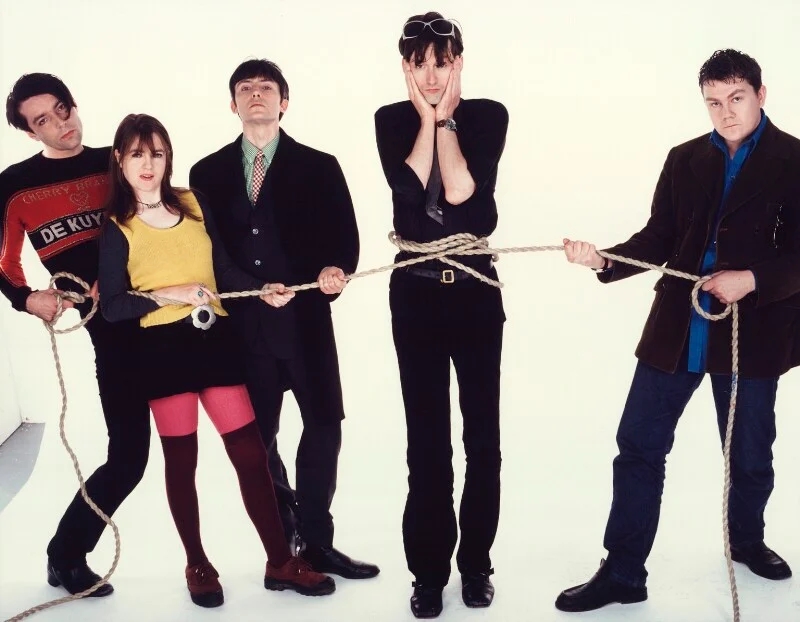Often when I’ve done a ‘Should Have Been a #1…’ post, it’s because the song featured was particularly unlucky when being deprived of top spot. ‘God Save the Queen’ may have been the victim of a political manoeuvre, ‘Happy Xmas (War Is Over)’ the victim of the festive holidays, and ‘Groove Is in the Heart’ runner up in the closest sales race ever…
But ‘Common People’ was beaten fair and square, by the more popular, better-selling record: Robson & Jerome’s double-‘A’ of ‘Unchained Melody’ and ‘White Cliffs of Dover’. Still, I do think that this was the biggest chart travesty ever… A travesty of public taste. But this post isn’t just a lamentation on Pulp’s poor fortune; it’s a tribute to all the Britpop records that never made number one. (Robson & Jerome did the double a few months later, also keeping Oasis’s ‘Wonderwall’ in second place behind their cover of ‘I Believe’.)
If our journey through 1995 has taught us anything, it’s that Britpop was badly served at the top of the singles chart. Few big musical movements are less well-represented at the top – maybe punk, and heavy metal. Oasis and Blur have had a #1 each, and they’ll have more going forward. In the weeks and months to come we’ll meet the Prodigy, the Verve, and the Manic Street Preachers (none of whom can truly be defined as ‘Britpop’) as well as a remixed Cornershop, and a dubious one from the Lightning Seeds. Maybe that’s the problem: what was Britpop? Blur were around way before the term was coined. Pulp had been going since the early eighties. Maybe true ‘Britpop’ is literally just Oasis…
Anyway, Pulp may precede and post-date Britpop, but ‘Common People’ is the ultimate Britpop anthem. It’s confident, cocky, clever, and very British. It condenses centuries of class history into four minutes, plus you can dance to it. It bestrides British pop culture to this day, cropping up most recently in a funny reference in ‘Saltburn’. It came from the ‘Different Class’ album – by my money the best Britpop LP – which also featured another #2: ‘Sorted for E’s & Whizz’ / ‘Mis-Shapes’… (kept off top by Simply Red).
‘Sorted…’ had some rock ‘n’ roll controversy about it, getting the Daily Mirror’s knickers in a twist about its ‘pro-drugs message’. (Even the most perfunctory listen to the song reveals a distinctly non-positive drugs message…) ‘Mis-Shapes’ meanwhile is an outsiders anthem – You could end up with a smack in the mouth, Just for standing out, now, really… – the antithesis to some of the more laddish elements of Britpop.
Away from Pulp, the second biggest Britpop #2 (from a band that didn’t otherwise make #1) is the evergreen, ever-perky ‘Alright’, by Supergrass – kept off top by the dreaded Outhere Brothers. An ode to being young – the band were still teenagers when it was recorded – it’s impossible not to feel cheered when you hear it, with lyrics like: We wake up, We go out, Smoke a fag, Put it out, See our friends, See the sights, Feel alright… (I’m a big Supergrass fan, and can confirm that ‘Alright’, as fun as it is, isn’t even close to being their best song. Do a deep dive!) They made #2 again in 1997, with the thumping ‘Richard III’.
Another close call came in January 1996, when the Bluetones took the jangly, Stone Roses leaning ‘Slight Return’ to #2. And the oft-maligned Kula Shaker were the other Britpop runners-up, their lightly psychedelic rockers ending up in 2nd place twice: ‘Hey Dude’, and a cover of sixties classic ‘Hush’.
And I’ll end with the band many claim kicked off the entire Britpop genre: Suede. They never managed even a #2; but here’s their biggest hit, from their biggest album – 1996’s #3 smash ‘Trash’.
‘Trash’ is another song – like ‘Alright’ and ‘Common People’ – that celebrates people’s weirdness, their exuberance, their individuality. Britpop, for all it’s Blur Vs Oasis boorishness, was often more concerned with everyone getting along, and having a good time. The perfect musical movement, perhaps, as we charged towards the end of the 20th Century, and the dark unknown of the Y2K. I was just a little too late to enjoy it fully (I turned twelve in early 1998, as the genre began to dissipate) but the shadows of it reached deep into the music of my teens, the Stereophonics and the Coldplays and the Travises, and on into the indie-rock revival of 2003-2007.
But at the same time, perhaps it’s difficult to define what Britpop is, and why so many of its biggest names pre-dated and then outlasted it, because it was the first big musical movement to rely heavily on sounds that had gone before. Britpop was essentially a ‘Best Of’ British rock, taking everything from the Beatles to the Stone Roses, and all that came inbetween – the Kinks, the Small Faces, Slade, the Jam – distilling it into great pop songs. It was the last big evolution of rock music in the 20th century, the century that birthed rock and roll, but perhaps it was so backward-facing, so reverential to what had gone before, that it was also the last evolution of rock music, full stop. Like a Greatest Hits tour before the end of the rock ‘n’ roll century. Post-Britpop, guitar-led music never again dominated the pop charts. In 2024, the dominant British stars are rappers, DJs, female pop singers, and scruffy singer-songwriters types. And while I’m not such a rock snob that I can’t enjoy other types of music – hopefully I’ve made that clear plenty of times on the blog – I also can’t help looking back nostalgically to a time when guitar bands were the sound of the pop charts (though not the sound of the number one spot…)
